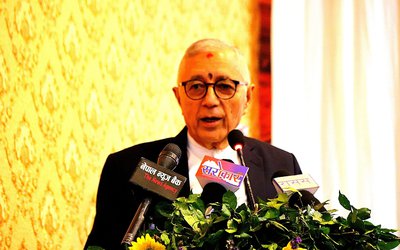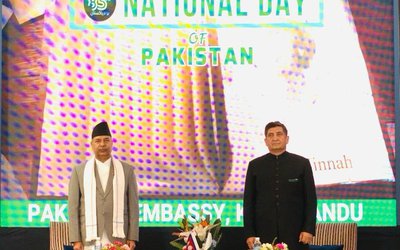
Nepal’s orthodox tea has finally received its own identity in the international market through a trademark after 154 years of beginning tea cultivation in the country.
According to The Himalayan Times, Nepal has received its own logo or trademark, with the long-standing efforts of the Nepal Tea and Coffee Development Board, organisations associated with tea production, and experts of the field. The trademark comprises an image of mountains with ‘Nepali Tea Quality from the Himalaya’ written below it. Prior to this, Nepal’s orthodox tea was being exported with the logo of Darjeeling, India.
Ministry of Agricultural Development, with the support of Himalaya Tea Producers Association and Nepal Tea and Coffee Development Board, has developed the logo and logo implementation directive. However, using and establishing the logo is still a big challenge, shared Chandra Bhusan Subba, a tea expert involved in the development of the logo and directive.
For the implementation of the logo, the Ministry has issued Nepali Orthodox Tea Certification Trademark Implementation Directive 2074. The directive has fixed certain standards for the use of the logo including that the produced tea must be fully organic. As per the directive, The tea producers wanting to use the logo must submit an application after which the process will move forward.
“Standards such as the quality of tea produced, employment security of the workers, sensitivity toward environmental protection must be met in order to use the logo,” said expert Subba. “The logo and the directive have been approved, now Nepali tea will carve its niche in the international market.”
With this move, Nepali tea would get good price in the international tea market and farmers would directly be benefited, therefore all should stress proper implementation of the logo, expert Subba said.
The tea farmers have become elated with the development of Nepal’s own trademark, also hoping that this will induce good business and sustainability.
The tea cultivation that began in the country from Ilam since BS 1920, has spread to 44 districts of the country. The then Chief of the district ‘Badahakim’ Gajaraj Singh Thapa had first cultivated tea in Ilam, after which a factory was set up in BS 1935 that started tea production from the district. Ilam is also home to the oldest and historical tea factory of the country.
- Pakistani Embassy In Kathmandu Hosted A Reception On 85th National Day
- Apr 16, 2025
- Earthquake Rocks Kathmandu Valley
- Apr 16, 2025
- Prof Dr Khadga KC assigned responsibility of TU Vice Chancellor
- Apr 16, 2025
- Weather Forecast: Partly Cloudy With Brief Rain In Kathmandu, Surkhet And Pokhara
- Apr 16, 2025
- Continuous Earthquake Tremors In Jajarkot
- Apr 15, 2025















